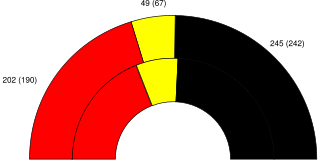
German federal election, 1965
Encyclopedia
The 5th German federal election, 1965, was conducted on 19 September 1965, to elect members to the Bundestag
(lower house) of West Germany
.

as Chancellor. In 1966, the FDP left the coalition over budget issues, and Erhard resigned. Kurt Georg Kiesinger
(also CDU) formed a new grand coalition
between the CDU/CSU and the SPD which lasted until the next election.
Bundestag
The Bundestag is a federal legislative body in Germany. In practice Germany is governed by a bicameral legislature, of which the Bundestag serves as the lower house and the Bundesrat the upper house. The Bundestag is established by the German Basic Law of 1949, as the successor to the earlier...
(lower house) of West Germany
West Germany
West Germany is the common English, but not official, name for the Federal Republic of Germany or FRG in the period between its creation in May 1949 to German reunification on 3 October 1990....
.
Issues and campaign
Federal Chancellor Ludwig Erhard was initially popular as the acclaimed "father" of West Germany's economic miracle of the 1950's and early 1960's. West Germany's economy still seemed solid in 1965, and thus not enough West German voters wanted to change the party of Federal Chancellor. To ensure his victory in this Bundestag election, Erhard promised to cut income tax and to increase social program spending (see, for example, Erling Bjöl, Grimberg's History of the Nations, volume 23: The Rich West, "Erhard's Victory and Fall," page 339; Dennis L. Bark and David R. Gress, A History of West Germany, volume 2: Democracy and Its Discontents, 1963-1988, London, UK: Basil Blackwell, 1989).Results
| Party | Party List votes | Vote percentage (change) | Total Seats (change) | Seat percentage | |||
|---|---|---|---|---|---|---|---|
| Christian Democratic Union (CDU) | 12,387,562 | 38.0% | +2.2% | 196 | +4 | 39.5% | |
| Christian Social Union (CSU) | 3,136,506 | 9.6% | +0.1% | 49 | -1 | 9.9% | |
| Free Democratic Party Free Democratic Party (Germany) The Free Democratic Party , abbreviated to FDP, is a centre-right classical liberal political party in Germany. It is led by Philipp Rösler and currently serves as the junior coalition partner to the Union in the German federal government... (FDP) |
3,096,739 | 9.5% | -3.3% | 49 | -18 | 9.9% | |
| Social Democratic Party Social Democratic Party of Germany The Social Democratic Party of Germany is a social-democratic political party in Germany... |
12,813,186 | 39.3% | +3.1% | 202 | +12 | 40.7% | |
| All Others | 1,186,449 | 3.6% | 0 | 0.0% | |||
| Totals | 32,620,442 | 100.0% | 496 | -3 | 100.0% | ||

Post-election
The coalition between the CDU/CSU and the FDP returned to government, with Ludwig ErhardLudwig Erhard
Ludwig Wilhelm Erhard was a German politician affiliated with the CDU and Chancellor of West Germany from 1963 until 1966. He is notable for his leading role in German postwar economic reform and economic recovery , particularly in his role as Minister of Economics under Chancellor Konrad Adenauer...
as Chancellor. In 1966, the FDP left the coalition over budget issues, and Erhard resigned. Kurt Georg Kiesinger
Kurt Georg Kiesinger
Kurt Georg Kiesinger was a German politician affiliated with the CDU and Chancellor of West Germany from 1 December 1966 until 21 October 1969.-Early career and wartime activities:...
(also CDU) formed a new grand coalition
Grand coalition
A grand coalition is an arrangement in a multi-party parliamentary system in which the two largest political parties of opposing political ideologies unite in a coalition government...
between the CDU/CSU and the SPD which lasted until the next election.

